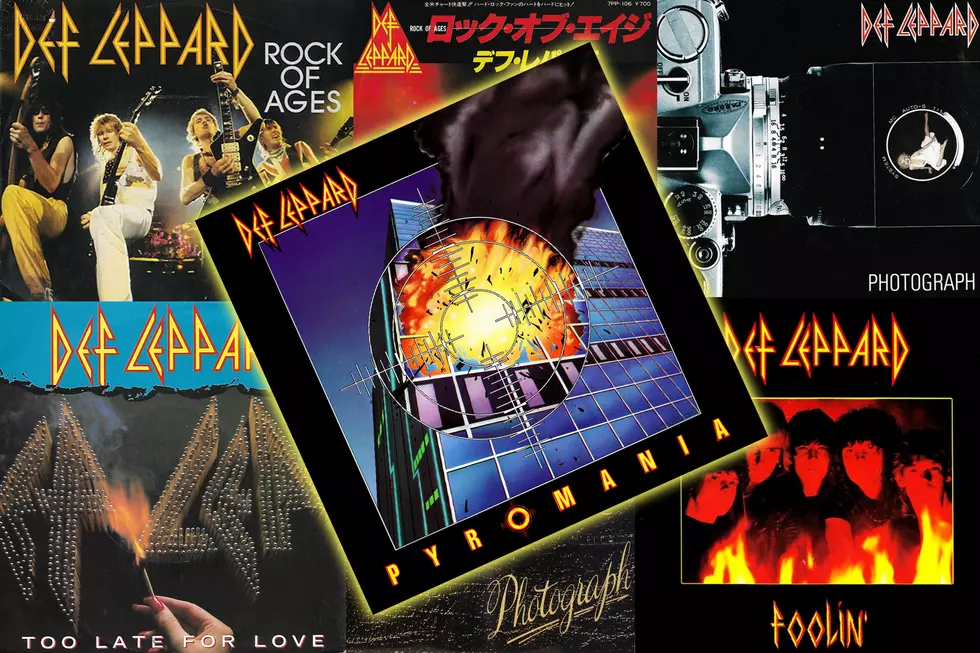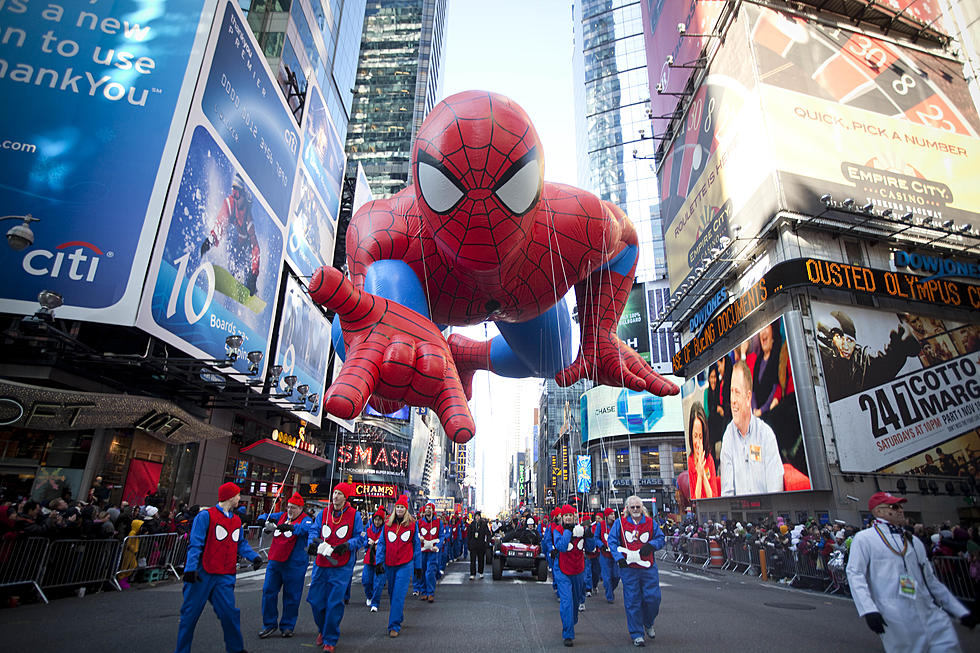
How Def Leppard Came of Age With ‘Pyromania': Exclusive Interview
Pyromania was the album that changed everything for Def Leppard. Guitarist Phil Collen vividly remembers the rapid ascent that happened after their third album was released in January of 1983. "We were little kids, really, still basically living with our moms and dads," he tells UCR now. "All of the sudden, you do this whole thing, go around the world and then you revisit it again. It's really special, actually."
41 years later, the "again" part of it all is the upcoming Pyromania 40 box set, which will be released April 26, featuring previously unreleased tracks, live footage and an extensive essay offering an overview of the time period and Def Leppard's rise to fame.
Driven by massive airplay on both radio and MTV, plus a grueling touring schedule of 178 concerts in less than a year, Pyromania helped make Def Leppard global superstars. During a recent conversation on Ultimate Classic Rock Nights, Collen shared his memories with host Matt Wardlaw.
The rough mix of "Photograph" is the first thing people are hearing from the box. What are your memories of working on that song?
They’d written the song and recorded a lot of the backing tracks for it. I would come in and work with [album producer] Mutt Lange, it was a guitar player’s dream. He would say, “Play some lead stuff over this, do a solo, but let’s figure a solo out that’s really melodic and does all of this stuff.” [The goal was to] just beef it up a little bit and do all of this stuff to it. But every section, because there were so many takes and multi-tracks of guitars, bass and everything, it went out of tune. So you’d have to tune for each section.
I’ve actually met people and they go, “Oh, I’ve tried to play along with ‘Photograph’ and it kind of goes out of tune in the middle there.” That was because whatever tuners we were using back then, you’d have to set them and it would kind of drift from each section. You’d spend a day on one section and tomorrow, it would be something else. So that’s what happened with that. It was a really weird one for me to get my head around. It was like, “Yeah, you have to tune to this for this section.” Obviously, you wouldn’t do that now, but it all worked out in the end! [Laughs]
READ MORE: How 'Photograph Sent Def Leppard Into the Stratosphere
Listen to Def Leppard's 'Photograph' Rough Mix
Joe Elliott called it a "labor of love," working on Pyromania. How do you think you grew as a result of the process?
Well, first off, you think you’re doing everything right until you meet someone like Mutt, who kind of points things out. Like the timing, I thought I was playing in time and he said, “No, no, you’re rushing. You’re racing with the excitement.” He said, “Listen to the groove of the snare, where you land on the snare.” He used to do it to [bassist] Rick [Savage] as well. It sounded a bit weird at first, but then he’d say, “Listen to Motown. Listen to the bass, James Jamerson, where he lands on the snare. If anything, it’s kind of a bit late, but it gives it a sexiness.” All of this is brand new to me. But he’s saying that. Then I’m listening to it and it’s some of my favorite stuff, the Motown, R&B, even some of the rock stuff, it all started making sense. There’s this groove that you have to get.
I think since then, I always feel great going on stage, knowing that I’m playing with these guys, this is my brothers. We have this thing. It gives you such a confidence. It’s like being in a bad ass gang. You have this thing. We have that and it was all developed because of Mutt and this sense of groove and where you fit in it. To make it sexy and not a throwaway [was such an important lesson]. The labor of love thing is one thing, but to get something so spectacular and so right, I think you would absolutely do that every time and we did. You know, when we did Hysteria, it was actually even more extreme. But when you first learn and have that kind of [moment of awakening], it’s like, “Whoa, this is very different and I’m moving into a different space."
READ MORE: How Def Leppard Took Rock Music Into a New Era With 'Hysteria'
How did MTV influence where you went with Pyromania?
It was everything. I don’t think MTV influenced how we did the record. But I remember once we were doing Hysteria, someone said to Mutt, “How come you take so long doing these songs?” He said, “So you’ll be talking about it in 30 years.” He was absolutely right. Here we are, more than 40 years on this one. That’s the thing. You have to get it right. It was like the perfect storm. There’s a visual thing, we always felt like we were more like Duran Duran than say, Iron Maiden. There was a very different kind of thing, because we had this different look. Even melodically, the song structure, there was an aggression to the rockness of it, obviously.
But there was something else. It was melodic without going too far like a lot of American bands that were great. Styx, Journey, Foreigner, REO Speedwagon, all of those bands, they’re such lovely sounding vocals, but we still had the Sex Pistols kind of shout-y [feeling to our music]. Slade, actually, that’s really where we were trying to come from. So if you could get the Slade chanting, melodically and in tune -- and you looked a certain way, [that was key]. The songs were an absolute hybrid. We didn’t plan that. We just wanted the music to sound like that. We happened to look that way -- and MTV was just emerging. All of the sudden, it was like, bang, it was absolutely perfect. MTV absolutely had so much to do with the success of the band, for sure.
How did you bond with Steve Clark?
Obviously, I knew him before. We jammed together. He and Joe would come down to London and sleep on my mum’s couch, when they were checking out things. I was in Girl at the time. We just became friends. When I joined the band, our playing styles were very different. But we just became really close friends, really quickly. We just had so much in common. It was just this journey of discovery. Not just music, but it would be [based around] artists as well -- we lived in Paris for a while. We just had a blast. You would absorb the culture and stuff like that. We became very focused on the same things. We enjoyed all of the same things. That’s how the friendship started and that’s how it got really deep as well.
I've heard how Steve was really enthusiastic about the new direction of the material on Pyromania. The Steve Clark we saw on stage, you don't picture, at least on the surface, that he'd be the kind to embrace the direction of the material.
Especially coming out of England, there was this New Wave of British Heavy Metal. A lot of it, wasn’t very professional and it wasn’t very deep. It was just like the punk thing, you’d have three great bands, the Pistols, the Clash, the Damned were pretty cool and there was other stuff that came around it. But there was a lot of stuff that was just people trying, having a go and having a laugh. Just jumping on the stage and stuff. That happened with a lot of the British stuff as well. There were all of these bands that they thought they were being serious, but they weren’t that great. Then, when you dig into real artistry, like Led Zeppelin, David Bowie and stuff like that, there’s a spirit in there. I think Steve was into that.
You know, the Rolling Stones, they started as a blues band. Someone said to them, “Look, the Beatles are writing all of their own songs. You can’t be a cover band, you’ve got to do something.” Mick Jagger and Keith Richards, I think they wrote “Paint it Black,” or one of these classic songs and it just went into a different area. It opened it up. It was almost like a spiritual awakening. I think Steve was into that. Again, talking about the friendship, the discovery thing and this constant quest to find something that’s new and different. Obviously, it’s so much harder these days, because it’s all been done. It’s been done and everything’s kind of a little bit derivative. You know, occasionally, you’ll hear something that’s really cool. But for the most part, it’s been done. We were still trying to discover that thing and Steve definitely was always in search of that.
READ MORE: Top 10 Steve Clark Def Leppard Songs
What's your favorite moment on Pyromania?
I think it's when I first heard the stuff. I knew the band and their last album, High 'n’ Dry, I thought that was really cool. I thought it sounded a bit like AC/DC, which it would have been, because Mutt had just produced [that band]. But I heard these backing tracks. Mutt was going, “Think of something to play over this. Take it home and let it sink in.” I’m going, “Whoa!” I’ve never heard anything like this. It’s kind of hard rock, but it’s also modern. It’s got an aggression, but it’s got melody. It’s not hokey, it’s still got the rock til ya drop, hurt your throat, Slade-chanting kind of choruses. It had everything that I was actually into, in a rock band. I’d never heard anything like that and that’s what blew me away. I was just so excited to be a part of that.
Joe Elliott Shares the Secrets Behind Def Leppard's 'Pyromania' Album Art
Def Leppard Albums Ranked
Gallery Credit: Nick DeRiso
More From WRKI and WINE










